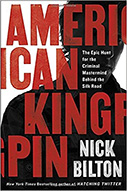AMERICAN KINGPIN: THE EPIC HUNT FOR THE CRIMINAL MASTERMIND BEHIND THE SILK ROAD

Author: Nick Bilton
Publisher: New York: Portfolio/Penguin Press, 2017. 352p.
Reviewer: Frederick T. Martens | October 2017
Conveniently, I came across an article in The Quarterly Journal of Economics (Volume 132, No. 2, May 1, 2017) titled “Smart and Illicit: Who Becomes an Entrepreneur and Do They Earn More?” The career of internet drug and contraband dealer Ross Ulbricht, aka “Dread Pirate Roberts,” could surely have been the predicate for this article. Indeed, Ulbricht manifested all the “smart” and “illicit” tendencies described in this ground-breaking research – tendencies that ultimately resulted in his “crossing the line” and engaging in criminal conduct.
As an example of “moral disengagement,” a concept framed by Albert Bandura (see Moral Disengagement: How People Do Harm and Live with Themselves), Ulbricht was the classic case of an entrepreneur who, in his case, believed that the laws proscribing drug use were essentially wrong, unfair and unsafe. Creating a marketplace where drug users could obtain their drugs free of violence and at the same time ensure the quality of the drug, would ostensibly reduce the social harms that the current laws of prohibition have showered on society. Thus, Ulbricht’s Silk Road became a website that promised big things.
Ross Ulbricht’s short-lived career represented one of many missed legitimate opportunities, foolish and utterly consequential decisions and choices, a narcissistic and delusionary personality, and of course hubris, the one trait that has been described as the principal downfall of CEO’s and politicians.
Having aspired to but failing to earn a Ph.D. in physics, Ulbricht created what was called an “Amazon for drugs.” He believed that he would ultimately demonstrate how the legalization of illegal drugs purchased on-line could reduce violence against consumers from the rather violent and unforgiving marketplace. He was out to prove that the free market for drug distribution using the internet represented a more viable and safer model than that of prohibition; at least that was his libertarian rationale, when coupled with an indescribable thirst for fame. Ulbricht certainly did not fit the prototype of an impoverished or disenfranchised minority group member, ascending “the queer ladder of social mobility;” nor did he suffer from the direr effects of differential association (See Bell, Daniel. “Crime as an American Way of Life: A Queer Ladder of Social Mobility” in Racial And Ethnic Relations: Selected Readings. New York: Crowell. 1966; and Sutherland, Donald. H. “Development of a Theory” in Edwin H. Sutherland In Analyzing Crime. Karl Schuessler (ed.). Chicago: University of Chicago Press. 1973.)
This unconventional entrepreneur may not have known much about underworld politics, values and mores, but his basic knowledge of computer technology coupled with his inquisitive mind, allowed him to create a website which was protected not by corrupt police and politicians, but rather by a computer program called “Thor.” In addition, the “money” exchanged for the drugs was virtual currency, Bit Coin, that was untraceable using traditional money laundering investigative methods.
The “structure” of Ulbricht’s criminal enterprise lacked clear or even shaded lines of authority. Instead, it was more representative of a “Facebook” for clients who wished to purchase drugs and other contraband through an anonymous and safe setting. This too would protect him from informants who might be predisposed to alerting the authorities. Indeed, Ulbricht amassed 1.2 billion dollars in revenue in one year, with minimal overhead and what he believed would be little if any fear of detection.
Ironically, Ulbricht’s vision did in fact have a societal benefit that most adherents of the current system of prohibition will likely choose to ignore — it demonstrated the futility of the “war on drugs.” Here was a young college graduate with marginal knowledge of the internet, who created a website that was responsible for taking a relatively amateur entrepreneur to the heights of being a major drug trafficker in a short period of time.
What Ulbricht proved was that a viable and highly lucrative drug market is awaiting the marketing skills of a Jeff Bezos type to actually capture and control the distribution of illicit drugs through the internet — not unlike certain forms of internet gambling. He would argue that government should embrace this new computer-driven system of distributing drugs if for no other reason than it would minimize the harms inflicted on society by the current laws of prohibition. But like most criminals who believe that they are smarter than their pursuers, Ulbricht made several mistakes that ultimately led to his downfall. As is often the case, trusting his romantic instincts led to instances where current and former lady-friends knew and talked too much.
Resorting to commissioning murders and beatings of cohorts who stole from him or threatened to expose his website to authorities often led him to “rationalize behavior at odds with his own principles. “And one unanticipated result was the mistake that led to identifying “Dread Pirate Roberts.”
Sifting through a number of websites that had been created around the time that Silk Road had become public, investigators were able to acquire a list of possible suspects, one of whom was RossUlbricht@ gmail.com. This e-mail address was like finding a “needle in the haystack,” or as the author points out, identifying the “Son of Sam” through an obscure parking ticket. Ross Ulbricht was now on the radar of the Feds.
Unfortunately, if this “cops and robbers” story suffers from one failure in its telling, it is the absence of court testimony that may have provided even greater insight into the thought processes and motivations that drove Ulbricht to abandon a law-abiding life style.
Did Ulbricht truly get drawn into this by altruistically subscribing to libertarian principles as he contends? Did the excitement of confounding the most sophisticated cyber-cops in the world draw him deeper and deeper into this vortex of criminality? Was it the accumulation of capital that he never thought he would achieve in a life-time feed his insatiable appetite? Answers to these questions and many more are certainly worth pursuing, as internet criminality represents the “crimes of the future.”
Nonetheless, court filings do provide some insight into his warped way of thinking. Perhaps the most illuminating was his morally-superior argument before the court that did nothing more than infuriate the judge. Ulbricht foolishly (as it turns out) argued that “increased drug distribution (via the internet) could be morally better for society by reducing violence and encouraging the sale of better-quality and therefore safer drugs.”
Having none of this nonsensical and self-serving rationalization, the judge sentenced Ulbricht to life in prison, contending: “you are no better a person than any other drug dealer and your education does not give you a special place of privilege in our system of criminal justice.”
For those entering the field of criminology and the study of “crimes of the powerful,” this latest theory of “moral disengagement” offers the nascent researcher an opportunity to build upon the various criminal typologies advanced by many of the early criminologists and social scientists who have studied criminal behavior and the environmental, psychological, and economic factors that fertilize law breaking.
While Ulbricht may have been on the cutting edge of technology that could be used to organize and rationalize criminal markets, there are any number of current and past political figures who have succumbed to gradual and incrementally-acquired forms of “moral disengagement,” starting with those who have held the highest office in their respective countries.
Perhaps one (of many) lessons that can be taken from the short-lived career of Ulbricht is that while innovation and the spirit of unbridled capitalism represent the essence of the American character, risk is a delicate conundrum that must be carefully navigated and cultivated, particularly by those who often consider themselves to be “above the law.”
Frederick T. Martens, former President of IASOC; former Adjunct at Penn State and The College of New Jersey; President of Complex Litigation Sciences, LLC


